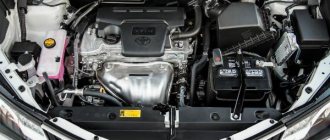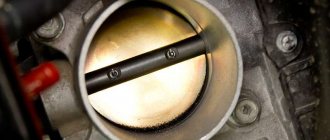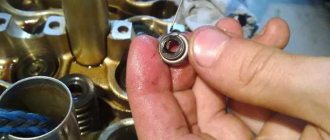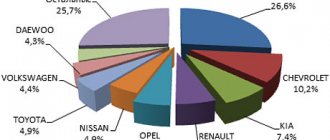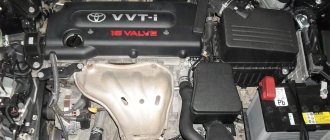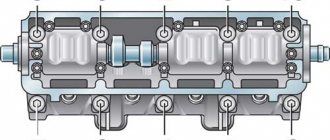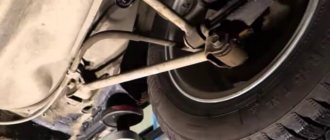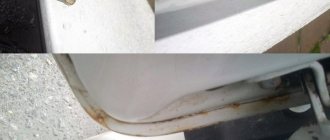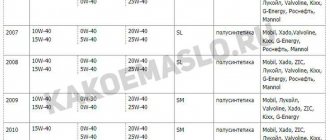Warranty terms
Warranty
The warranty for a Toyota vehicle covers defects related to the quality of workmanship or materials that arose during the manufacture of the vehicle or its operation. The vehicle warranty is valid for 36 months (3 years) from the date the new Toyota vehicle is delivered to the first owner or until the vehicle reaches 100,000 km, whichever occurs first. Warranty obligations are valid subject to the owner's compliance with the rules and requirements for operating a Toyota vehicle specified in the Owner's Manual.
Guarantee against through corrosion and on the paintwork of the car body
The manufacturer guarantees that the body paint of a Toyota vehicle will be free from perforation corrosion and manufacturing defects for a period of 36 months (3 years) from the date of delivery of the new Toyota vehicle to the first owner or until the vehicle reaches 100,000 km, whichever occurs first, excluding the cargo platform. "pickup" type.
The manufacturer guarantees the absence of through corrosion and manufacturing defects in the paint coating of the cargo bed of a Toyota pickup truck for 12 months (1 year) from the date of delivery of the new Toyota pickup truck to the first owner or up to 20,000 km, depending on what will come earlier.
Warranty for hybrid components
The components of the hybrid system, such as the high-voltage battery, the electronic control unit (ECU) of the high-voltage battery, the ECU of the hybrid system, the converter-inverter of the hybrid system, are guaranteed by the manufacturer for a period of 5 years from the date of delivery of the new Toyota vehicle to the first owner, or 100,000 km. , whichever comes first. Moreover, in case of repair by replacing the specified components of the hybrid installation under warranty, a warranty period is established for the new component of the hybrid installation equal to the period of time between the date of its installation on the vehicle and the expiration date of the warranty period for the corresponding replaced component of the hybrid installation.
Spare parts warranty
Original Toyota spare parts purchased from the Dealer are guaranteed from the date of purchase of the spare parts until the expiration of 12 months (1 year), regardless of mileage. The owner has the right to make claims related to defects in spare parts only during the warranty period for original Toyota spare parts. This warranty does not cover non-original spare parts, as well as defects resulting from the use of non-original spare parts.
Accessory Warranty
Original Toyota accessories purchased from a Dealer are provided with a Warranty from the date of purchase of Original Toyota Accessories until the expiration of the warranty period for the Toyota vehicle, but not less than 12 months (1 year). The owner has the right to make claims related to defects in original Toyota accessories only during the warranty period for the accessories. The use of non-genuine accessories may reduce the performance, safety and durability of your Toyota vehicle and may not satisfy your warranty claims.
Delivery for repairs
In the event of a malfunction of a Toyota car, as a result of which further travel becomes unsafe or impossible, the Owner’s costs for transporting the car to the nearest Toyota dealer in the Russian Federation and the Republic of Belarus will be compensated, provided that the malfunction is recognized as covered by warranty.
The warranty is the cornerstone of the relationship between the dealer and the buyer of a new car. On the one hand, a favorable warranty becomes one of the factors when choosing a particular brand, on the other hand, after carefully reading the contract, sometimes everything turns out not to be as originally imagined. Here, each automaker and dealer has its own characteristics and pitfalls. Of course, in order to know exactly what and how, you need to read the terms of the guarantee from cover to cover. We decided to find out the most interesting and important points that everyone who is planning to purchase a new car should know about.
Audi
Since 2013, all models are covered by an extended 3-year factory warranty. Audi three-year warranty – 2 years without mileage limitation and an additional third year for a total vehicle mileage of no more than 90,000 km, whichever comes first. The paint warranty remains for 3 years, and the body piercing warranty is 12 years without mileage limitation. According to established practice, each warranty case is considered individually. If a breakdown occurs during the warranty period, a request is sent to the factory, and if the defect is confirmed there, the car is repaired under warranty. We were unable to find out any additional operating conditions during the warranty period.
BMW
Official BMW dealers provide a twelve-year warranty against perforation of the body and a three-year warranty on the paintwork. The two-year warranty, regardless of mileage, covers the entire vehicle (except for replacement of wearing parts), original BMW spare parts, as well as original accessories. Unfortunately, we did not find a publicly available list of parts subject to natural wear and tear, but we can assume that it will be the same as that of other automakers. The warranty also does not cover “damage that occurs during storage due to a cause beyond BMW’s control.” The question remains what kind of damage may occur during storage.
Chery
There are two types of warranty for Chinese cars of this brand. The first is for the special use of vehicles under conditions of increased operating loads. This refers to the commercial use of a car aimed at generating business profit, for example, in taxi mode, as delivery vehicles for postal and courier companies, etc. In this case, the warranty period is 12 months with a mileage of no more than 60,000 km, whichever comes first. In case of normal use, the warranty is standard 3 years or 100,000 km. But there is a list of individual components and assemblies that have shorter warranty periods.
The “black” list includes suspension parts - front and rear shock absorbers, springs, leaf springs, ball joints, suspension joints, control arm bushings, stabilizer links. They come with a warranty of only 20,000 km or 12 months. The same list includes the fuel pump, injectors, generator, climate control elements and parts. But the most unpleasant thing is the clutch discs, the warranty for which is only 5,000 km or 3 months. It should also be remembered that exceeding the car’s mileage by 200 km beyond the limit established for scheduled maintenance entails cancellation of the warranty.
The warranty on the paintwork and the body itself against corrosion implies that the owner will carry out anti-corrosion treatment at his own expense within 30 calendar days from the date of purchase of the car and then at least every 24 months. Well, in addition, it is necessary to strictly follow all the rules for operating the car and the requirements for cleaning and caring for the body and paintwork, reflected in the operating manual.
Citroën
Like Peugeot, the company provides a two-year, unlimited mileage warranty on all cars, including those assembled in Russia. Similarly with the concern partner: there are a number of restrictions on parts subject to natural wear and tear, which are almost exactly the same as those for Peugeot cars. For Citroen cars equipped with proprietary hydropneumatic suspension, the warranty on its elements (pneumatic cylinders, spheres and suspension cylinders) is 40,000 km, 60,000 km on the starter and generator.
Chevrolet
The GM DAT warranty covers 3 years or 100,000 km, whichever comes first, but the first 24 months are without mileage limitation. The warranty on paintwork is 3 years or 100,000 km, and against through corrosion - 6 years, regardless of mileage. The warranty on the body and paintwork only applies if they are checked annually for damage and corrosion at a branded service station. The warranty does not cover spare parts subject to natural wear and tear: drive belts, brake discs, clutch friction discs, windshield wiper blades. In general, a standard set. True, the elements and parts of the suspension are not indicated in the list, but perhaps they are hidden under the meaningful abbreviation “etc.” This point must be clarified with the dealer when purchasing.
Before purchasing, find out with your warranty engineer everything that is hidden under the wording “natural wear and tear” - this concept can be interpreted very loosely.
Great Wall
Warranties and conditions for Great Wall cars are almost completely the same as those for the Chery brand, with only some difference in the warranty for parts subject to natural wear and tear. For example, suspension parts such as shock absorbers, springs and springs are guaranteed for 1 year or 40,000 km. For other suspension parts, the warranty is 1 year or 30,000 km. Otherwise, everything is completely the same.
Ford
The German company is a record holder for the warranty provided. From 05/15/2012 it is 5 years or 160,000 km (except for the Ford Explorer model). The warranty against through corrosion for passenger cars is 12 years. Moreover, there are no special conditions - everything is standard: the warranty does not cover scheduled adjustments and replacement of consumables (such as oils, working fluids, spark plugs, filters, incandescent lamps) and wearing elements (such as friction materials for brakes and clutches, wiper blades, drive belts). However, the warranty covers these materials and parts if replacement is required due to an original defect or a material defect. And, of course, the car must be operated in full accordance with the factory instructions.
Geely
The Belarusian manufacturer of Chinese cars Geely gives a standard warranty for its cars - 3 years or 100,000 km. The list of restrictions is not that serious. Rubber parts (tires, brushes, pipes, bushings, boots), brake and clutch discs and linings, exhaust system, battery are guaranteed for 6 months or 10,000 km. Shock absorbers, catalyst, ignition system are guaranteed for 2 years or 60,000 km. The warranty period for paintwork and through corrosion is 3 years, subject to an annual inspection at the dealer.
Honda
The Japanese manufacturer's warranty looks standard - 3 years or 100,000 km. HONDA guarantees that any faults associated with defects in individual parts and poor workmanship will be repaired free of charge on the vehicle for a period of 3 years, starting from the date of sale of the vehicle, or for 100,000 km, whichever occurs. previously.
During this period, free repairs or replacement of parts or assemblies will be carried out if any of the defects covered by the warranty are detected in the vehicle. But we did not find a list of restrictions on parts changed under warranty. But Honda guarantees that any battery faults will be fixed free of charge on the car for 1 year without mileage limitation.
Knocks, noises, hums, vibrations, squeaks that do not affect the performance of the car, in most cases are not a reason for warranty repairs.
Hyundai
The Korean brand was one of the first on the European market to offer a 5-year warranty, albeit with a mileage limit of 100,000 km. Well, and, of course, such a guarantee has a number of limitations, although not too serious. Thus, the warranty for the battery is 2 years or 40,000 km, for parts subject to natural wear and tear (brakes, drive belts, spark plugs, light bulbs, glass, etc.) - 1 year or 20,000 km. Small suspension parts are replaced under warranty for 1 year or 50,000 km, shock absorbers have a warranty of 100,000 km or 3 years. The warranty on the paintwork is 5 years or 100,000 kilometers, but only subject to mandatory inspection of the paintwork every six months.
KIA
Despite the fact that the Kia and Hyundai models are co-platform and belong to the same concern, their warranty conditions differ. Kia offers unprecedented conditions - 5 years or 150,000 km. But, of course, with a number of restrictions. For the battery - one year, for the paintwork - three years with a mileage limit of 150,000 km, warranty against through body corrosion - 10 years without mileage limitation. And, by the way, the warranty agreement does not contain a requirement to check the condition of the body every six months. But, by analogy with Hyundai, the warranty for parts subject to natural wear and tear is limited to one year or 20,000 km, for small suspension parts - 50,000 km or 5 years, for shock absorbers, silent blocks, ball joints - 100,000 km or 5 years .
Mazda
The Japanese concern offers a 3-year or 100,000 km warranty for its cars. The warranty on paintwork is 3 years without mileage limitation, but the warranty against through corrosion is 12 years. True, for the Mazda BT-50 model it is 6 years, apparently due to the more severe operating conditions of the pickup truck. And you also need to inspect and assess the condition of the body at your own expense at a company service station every year. Interestingly, even adjustment work (for example, wheel balancing, wheel alignment adjustment, belt tension, etc.) is covered by Mazda’s warranty. This warranty is valid for 3 months or 6,000 km.
The list of warranty limitations is very sparse. This includes parts that are subject to normal wear and tear (without specifying which ones), as well as original Mazda parts or accessories installed on the vehicle during warranty repairs performed under the terms of the Mazda New Vehicle Limited Warranty.
Mercedes-Benz
The company provides a 2-year unlimited mileage warranty on its vehicles and a 12-year warranty against perforation corrosion. As with others, normal wear and tear is not subject to warranty, and the list of such parts includes shock absorbers and clutch parts. In any case, Daimler AG reserves the right to determine whether a given case is covered by warranty. The decision to accept or reject a warranty claim is made by the relevant service. At the request of the buyer, he is provided with information about the recognition or rejection of his claim in writing, but without indicating the reason for the failure of the part, assembly or unit.
MG
The former British brand, now owned by the Chinese concern SAIC, provides a warranty of 3 years or 100,000 km. Special warranty periods apply to glass elements - windshield, rear and side windows - 4,500 km or 3 months; battery – 20,000 km or 1 year. Warranty against through corrosion – 3 years or 100,000 km. The list of parts that are not covered by the warranty is standard. These are parts subject to natural wear, exhaust system elements, etc. Nothing is said about the suspension parts, although they can easily be classified as “subject to natural wear.” Over-mileage between maintenance is allowed within 1,000 km or 1 month, which will be enough for even the most forgetful and busy owner.
Remember - any additional equipment installed “outside” may automatically void your warranty, even if it was just a backlight bulb.
Mitsubishi
The warranty is 3 years or 100,000 km, with no mileage limitation for the first two years. Warranty against perforation corrosion – six years without mileage limitation. Warranty for specific components – 50,000 km or 1 year. This list includes the battery, diesel engine injectors, and turbocharger. The list of parts not covered by the warranty is standard - everything related to natural wear and tear. The clutch discs also got there, as well as parts damaged in the event of its failure.
Nissan
The company offers the following warranty conditions: for new cars - 3 years or 100,000 km, for painting - 3 years without mileage limitation, through corrosion warranty - 6 years without mileage limitation for Patrol, Terrano, Almera models; Warranty against perforation corrosion – 12 years without mileage limitation for all other models. Warranty on original spare parts and accessories – 1 year without mileage limitation. Unfortunately, there is no more detailed information on the dealer’s official website, so special warranty conditions must be clarified at the car dealership.
Opel
The warranty for cars of this brand is 2 years without mileage limitation. The guarantee against through corrosion is 12 years, however, subject to an annual documented inspection of the body and the associated elimination of damage to the paintwork, lower surface and protection of hidden cavities, as well as annual polishing and external preservation of the body. The list of parts that are not covered by the warranty is unpleasantly surprising. In addition to the already standard “subject to natural wear” shock absorbers, springs, steering parts, and wheel bearings were included. Most automakers have at least a limited warranty on these parts.
Peugeot
The company provides a 2-year unlimited mileage warranty on all cars. The warranty on paintwork is 3 years for passenger cars, for commercial vehicles - for the duration of the contractual warranty. The warranty against perforation corrosion is 12 years for passenger cars and 5 years for commercial vehicles. The most important thing is that if the car breaks down during the journey for reasons covered by the warranty, the company provides compensation for the cost of towing the car. Parts subject to normal wear and tear are subject to a limited warranty. For example, the warranty for the clutch and most suspension and steering parts is 40,000 km, for front and rear brake pads - 2,500 km, for brake discs - 10,000 km, 1 year - for the battery.
Renault
The warranty for Renault cars sold in Belarus is 3 years or 100,000 km for passenger cars and 2 years without mileage limitation for commercial vehicles (Renault Dokker Fourgon, Renault Master, Renault Master RWD). With parts subject to natural wear and tear, everything is simple. The warranty for “consumables” and wear parts covers a mileage of up to 30,000 km. Faults of unknown origin can be eliminated under warranty if no more than 6 months have passed since the vehicle was handed over to the owner or the vehicle’s mileage does not exceed 10,000 km.
Skoda
New SKODA cars purchased in the Republic of Belarus are provided with a 2-year warranty without mileage limitation. You can also purchase an Extended Warranty, which provides two additional years of warranty service. The warranty on the paintwork is 3 years, on the body - 12 years without mileage limitation. Everything else is standard. The warranty does not apply to parts subject to normal wear and tear, such as clutch linings, brake discs, brake pads, bulbs, windshield wiper blades, tires, filters, etc. What is meant by “other.” - apparently deciphered in the purchase and sale agreement.
Subaru
Guarantees proper operation of the vehicle for 3 years or 100,000 km. Anti-corrosion warranty – 6 years without mileage limitation. In the section of the Warranty Agreement there is an interesting phrase: “If a defect is discovered (such a case can only be exceptional) falling under the warranty, the Seller will carry out the necessary repairs using new or refurbished parts if it is determined that the cause of the defect is the use of low-quality materials during the production of a car or violation of production technology.” This is how the company hints that the presence of any defects on Subaru cars is an exceptional case! This is probably why the list of warranty limitations takes several pages. Among other things, “difficulty starting the engine in conditions of high humidity or sub-zero temperatures” is not a malfunction. However, the permissible limits of humidity or temperature are not indicated. All parts that require periodic replacement, including the clutch, are not covered by the warranty. But Subaru boasts a 1-year tire warranty. However, complaints about knocks, noises, hums, vibrations, and squeaks that do not affect the performance of the vehicle are not covered under warranty.
Suzuki
The warranty period for Suzuki cars is 3 years or 100,000 km with the exception of certain elements, as well as subject to the restrictions specified in the warranty service book. The list of restrictions is quite small. As usual, all the “consumables” went there, as well as parts subject to natural wear and tear, including brake discs and pads, and clutch parts. But from the suspension, only the anti-roll bar bushings have a limited warranty - 1 year or 15,000 km. According to the automaker, restarting the engine at temperatures below -15 degrees and shocks (impacts) felt when switching the transmission to up or down gear are not disadvantages. Not every owner will like this. But between THAT. It is allowed to drive 2,000 km more than the required mileage for maintenance.
Free evacuation or towing in the event of a “warranty” breakdown is a rare bonus from Belarusian dealers.
Toyota
Despite the legends about reliability, the warranty period for Toyota cars is standard - 3 years or 100,000 km. A similar guarantee is given to protect the body from through corrosion. Toyota, like Peugeot, guarantees that the vehicle will be delivered (towed or towed) to the nearest authorized dealer or authorized partner for repair if the owner's claims are covered by the warranty and the vehicle cannot be driven under its own power or further travel becomes unsafe. Warranty obligations do not apply to consumables, brake discs and pads, clutch discs, as well as to adjustment work the need for which arose during the operation of the vehicle. In general, the terms of the guarantee are very attractive. Only one thing can upset you - the maximum mileage from the moment you need to provide the car for maintenance is only 250 km.
Volkswagen
Passenger models of the brand are covered by a 3-year warranty without mileage limitation, for commercial models - 3 years, but not more than 250,000 km in the third year. The warranty on the paintwork is 3 years, the warranty against through corrosion is 12 years. True, it is rather vaguely stipulated that if malfunctions (deficiencies) of the paintwork or malfunctions (deficiencies) in the form of through corrosion of the body were the result of external influences or insufficient care of the car, then this is no longer a warranty case. What is meant by “external influence” must be clarified with a warranty engineer. But all other conditions are very interesting. For example, there are restrictions only for consumables - filters, brake pads, windshield wiper blades, spark plugs, tires. All suspension parts, steering and other components are covered by a warranty, without any mileage restrictions.
Volvo
Swedish cars come with a two-year, unlimited mileage warranty. Fun fact: Parts that need to be replaced during normal routine maintenance are covered by the manufacturer's warranty. This warranty period is covered until the first part replacement according to the maintenance plan and does not exceed the time and mileage limitations applicable to the vehicle warranty. This applies to the following items: spark plugs, oil filters, pollen filters, fuel filters, drive belts and lubricants. The list of exceptions that are not covered by the warranty is quite short: technical fluids, windshield wiper blades, drive belts, worn brake pads, discs and calipers. Volvo is not responsible for any repairs or replacements required as a direct result of normal wear and tear. But there is no list of parts that fall under the concept of “normal wear” in open documents.
UZ-Daewoo
The standard warranty for cars of this brand is 3 years or 100,000 km. Body warranty – 3 years without mileage limitation. There are also special restrictions on some parts and mechanisms. For example, for suspension and steering ball joints, silent blocks, steering rack, wheel bearings, the warranty is 3 years or 50,000 km. Shock absorbers, fuel pumps, injectors, heating and air conditioning system parts are guaranteed for 1 year or 20,000 km. But for parts subject to natural wear and tear, the warranty is 6 months or 10,000 km. This list includes brake discs and pads, clutch parts, windshield wiper blades, light bulbs, rubber boots, bushings and even the catalytic converter. During the warranty period, the vehicle's mileage when undergoing regular maintenance should not exceed 30 days or 1,000 km.
UAZ
The Russian manufacturer announced an increase in the warranty period for its cars to 3 years or 100,000 km, like all global automakers. This became possible thanks to a set of measures aimed at improving quality at every stage of production. The extended warranty period applies to vehicles manufactured since January 2011, starting with VIN number 316300B0006560. In addition, the brand dealer provides customers with a double warranty period. You just have to remember that the warranty does not apply to parts and materials with regulated mileage specified in the service book; on parts subject to wear, depending on the intensity, operating conditions and driving style of the car owner. Unfortunately, nothing is said about a separate warranty for the body.
Land Rover/Jaguar
Land Rover SUVs have a standard 3-year/100,000km warranty, while Jaguar offers a three-year/unlimited kilometer warranty. We were unable to obtain more detailed information. But, according to the warranty engineer, there are no special restrictions on components and assemblies for these cars. It can be assumed that any breakdowns and malfunctions that occur during the warranty period are resolved on an individual basis. By the way, the situation is similar with Porsche cars.
Pay attention to the restriction on “re-mileage” until the next maintenance - this is a reason to punish the owner by canceling the warranty.
So, what conclusions can be drawn from all this information? The first, simplest and most important thing is to read the contract carefully. The truth is hackneyed, but at the same time, a huge number of buyers do not follow it every time. And then he is surprised to talk to the warranty engineer, not understanding why he is being denied warranty repairs.
Second conclusion. Strictly follow the instructions in the owner's manual so that the dealer does not have a legal reason to void the vehicle's warranty. If something is unclear, clarify it immediately.
One more thing. The body warranty can be considered a pure fiction and one can rely on the loyalty of the dealer.
For almost all dealers, the effect of salt and sand on the body is a reason not to recognize corrosion and damage to the paintwork as a warranty case, and there is only one way to escape the salt-sand mixture on our roads - do not operate the car in winter, or go to the car wash very often.
Information on the terms of guarantees is given as of November 27, 2013. Changes are possible over time. The purpose of the article is to convey information to car buyers that warranties and limitations on warranties can vary significantly depending on the manufacturer and it is important for consumers to understand in advance all the operating conditions of the purchased car. Due to the impossibility of presenting the terms of guarantees in full, we present selectively the most important aspects and interesting facts about guarantees received in open sources or through official requests. If a representative of a car brand has the opinion that the warranty data provided in the review does not give an accurate picture of the warranty, or forms a different opinion from the representative about the attractiveness of the warranty for consumers, please send more detailed information about the warranties and their limitations by email [email protected]
The excerpt of information about guarantees in this review under no circumstances constitutes a public offer when purchasing a car. The terms of the guarantee are established on the basis of the purchase and sale agreement between the seller and the buyer.
Options and rates
Extended warranty schemes vary widely. As a rule, for each model the company offers three or four options, the differences are in prices and the number of components and assemblies for which the warranty is valid for a specified period (usually up to five to six years from the date of sale). Often, it is not the company, but the dealer network that offers its own “extension” (for example, the Major holding, a dealer of 43 brands).
Cunning options like what Volkswagen and Skoda have are also practiced. The Das WeltAuto program has been developed for their used cars. If the Rapid or Tiguan is still under five years old, but has covered over 100,000 km, you can extend the warranty in six-month increments for a fee. According to the conditions, the warranty is similar to the factory one for new cars, but has two types of coverage - “7 elements” and “15 elements”. At different prices, of course.
